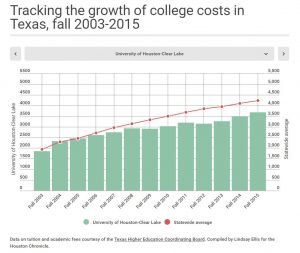Texas Senate passes two new tuition bills
The Texas Senate is addressing rising university tuition costs by passing Senate Bill 19, freezing tuition for two years and instituting limitations on future increases based on performance measures. The Texas Senate also passed Senate Bill 18, removing the requirement for a portion of tuition to be set aside for financial assistance.
Texas Senate Bill 19 – Tuition freeze and performance requirements on future increases
Senate Bill 19 passed the Senate April 4. The House received the bill April 5. If the bill passes the House, it will progress to the governor to sign, decline to sign or veto. A veto can be overridden with a two-thirds vote in both the House and Senate.
The idea of a tuition freeze and performance-based increases received mixed reactions from the University of Houston-Clear Lake (UHCL) student population.
Brooke Hyde, sophomore, is against tuition increases.
“I’d rather not have to pay more money,” Hyde said. “Keep it as low as possible for as long as possible.”

Hyde’s friend, Layal Bana, sophomore, also agreed.
“I feel like it is expensive enough,” Bana said.
Dominic Moorman, sophomore, did not agree with freezing tuition.
“There are some universities that might be growing and need that money,” Moorman said.
Moorman did agree with performance-based tuition increases requiring universities to meet certain standards.
“If it’s a public university, they should prove that they are advancing their campus or making things better for their students before they increase their tuition,” Moorman said.
Alejandro Garcia, press secretary for the Office of the Lieutenant Governor, said Senate Bill 19 is a top priority for the lieutenant governor.
“State funding for public universities has increased dramatically in recent years, but it hasn’t kept pace with the increase in institutional spending,” Garcia said. “Since 2002, total academic charges at public institutions in Texas have risen 147 percent while the median household incomes of Texans have risen only 32 percent. Lt. Governor Patrick made Senate Bill 19 a top priority in this legislative session order to freeze tuition and fees for two years and help close that gap.”
A partial explanation for the tuition increases that have occurred since 2002 involves the deregulation of tuition caps in 2003. In 2003 Texas faced a $9.9 billion budget shortfall under then Gov. Rick Perry. Addressing the budget shortfall, Texas legislators cut university funding by 7 percent. To compensate for the loss of state funding, Texas deregulated the amount of tuition Texas public universities could charge by removing the cap of $46 per semester credit hour, providing universities financial flexibility to make up for the shortfall.
University officials express concern regarding the tuition freeze and performance base tuition requirements.
J. B. Bird, director of media relations for the University of Texas at Austin, disagrees with the new bills and believes that universities best understand their positions regarding their budgets and tuition.
“We have demonstrated during the past decade that we will keep UT Austin affordable,” Bird said. “The Regents have raised tuition just once in the past five years and less than lawmakers raised it before deregulation. Our tuition remains among the lowest in our national peer group, lower than several other Texas schools.”
In addition to the proposed tuition freeze, the Texas Senate is planning cuts to university funding with its current budget proposal, which could reduce university funds between 6 and 10 percent.
“Given the budget situation, freezing tuition for two years is particularly worrisome for a University System that might have to cut $35 million,” said Jason Smith, vice chancellor of government relations for the UH System. “For us to not have the option to make up some of that revenue through modest increases in tuition, even to keep up with annual cost increases in higher education, is concerning. We’re sensitive to our students’ ability to handle any increase, but if all of these things happen together, it’s going to be very difficult to provide the same quality of education going forward.”

UHCL President William Staples voiced concern regarding tuition freezes concurrent with budget cuts and believes all 38 public universities will have budget cuts.
“I’m not sure that having budget cuts and then on top of that freezing tuition for the next two years makes a great deal of sense,” Staples said. “I think it would cause universities to potentially have to reassess what they are doing, given what would be the reduced funding.”
Staples further expressed concern on the effect that tuition freezes could have on Texas and national universities in the long term.
“If you look at formula funding rates from the state for public universities right now, they are less today than they were 12 years ago,” Staples said. “The percentage of our budgets that are covered by state appropriations has gone down. And the percentage of our budgets where we get the revenue from tuition has gone up. Longer term that is of significant concern, if that trend continues, and I think it will, is then what really happens to universities?”
Staples noted the level of tuition that would need to be charged to make up for a lesser percentage in state formula funding would increase, and how that could affect a growing number of students who are academically capable but economically disadvantaged facing higher tuition rates.
“That to me is a very bad situation,” Staples said. “Then we are potentially going to have a less educated population in the state of Texas and in our county. That presents major problems down the road.”
Texas Senate Bill 18 – Eliminating required tuition set aside for financial aid
Senate Bill 18, if passed into law, will eliminate the requirement for tuition set aside for financial assistance.
Currently, 15 percent of tuition is set aside for financial assistance at UHCL. Students expressed both positive and negative thoughts on tuition set aside for financial aid.
“I personally don’t have a problem with helping other students that need help,” Moorman said. “I have received a scholarship from the school too. If, through my tuition, I am helping pay it back or pay it forward somehow I really don’t have a problem with that.”
Hyde said she preferred her tuition be applied to her education.
The lieutenant governor’s office is prioritizing Senate Bill 18.
“Senate Bill 18, another priority for the Lt. Governor, will eliminate a hidden tax that students pay as part of their tuition,” Garcia said.
Universities have expressed concerns that, while it may offer more flexibility with budgets, it has the potential to adversely affect students in need of financial assistance.
“Short term, it gives us freedom to decide how our money is distributed to students in need,” Smith said. “Long term, there’s a concern that the Legislature won’t continue to invest in higher education, and it will put pressure on universities to limit the amount of financial aid to students.”
Bird said more than half of the students at UT Austin rely on need-based financial aid to fulfill their goals of receiving a UT education.
“During the past few sessions, some aid programs have been cut and TEXAS Grants have not kept pace with increased student need,” Bird said. “This limits our ability to support low-and-middle-income students and threatens our affordability and accessibility. Losing the ‘set-aside’ and the financial aid that it supports would have a negative impact on thousands of families and put college out of reach for many of them.”
Staples acknowledged that while the elimination of the required tuition set asides for financial assistance would provide greater flexibility in how the university might use the funds, in reality, a good part of the funds would still be needed for financial assistance.
Staples said from 2004/2005 to 2014/2015, the percentage of economically disadvantaged students in our area has gone up dramatically.
“We are going to have a number of potential college students coming out of high schools that are economically disadvantaged but academically capable,” Staples said. “How do we make sure that those students really have access to higher education? Given the circumstances, we are in and what we are seeing in terms of the economic ability of future students to pay for higher education, a good part of that money would still be used for financial aid. In the case of UHCL, there would still be a large amount of what would have been, if this passes, of the financial aid set aside that we would still in fact use for financial aid.”
The current Texas legislative session ends May 29, 2017.

